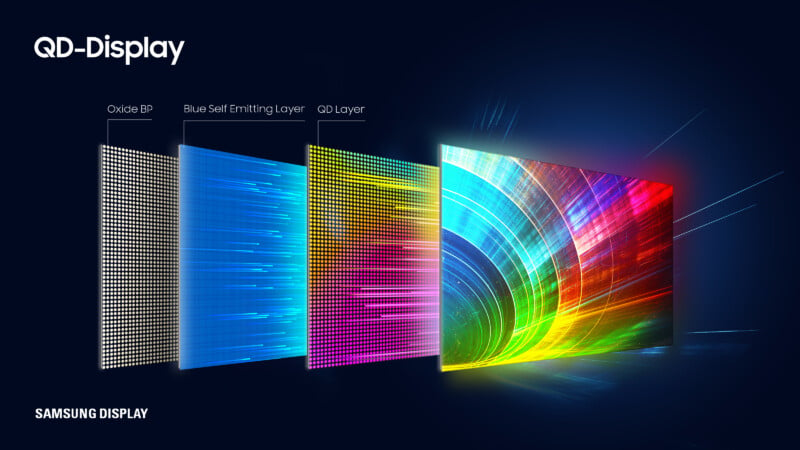Canon Has Developed New QD-OLED Panel Tech to Compete With Samsung
![]()
Canon has reportedly developed its own method for quantum dot organic light emitting diode (QD-OLED) technology that doesn’t use rare metals, putting it in position to compete with Samsung, the only current manufacturer of the QD-OLED panels.
OLED panels are one of the most popular display technologies currently on the market because of their outstanding color reproduction, instantaneous response time, and the ability to render true blacks. OLEDs are the base of basically every major camera manufacturer’s electronic viewfinder and is the reason most modern mirrorless camera viewfinders look so true-to-life.
As explained by panel expert Simon Cohen at Digital Trends, QD-OLED is a hybrid display technology that mixes traditional OLED tech with quantum dots to produce an even better result. QD-OLED, which is a Samsung technology, was first introduced within the last two years and addressed two of the major issues with the original OLED technology: brightness and burn-in.

Cohen’s explanation of how the technology works, and why, is the best place to get a firm grasp of the concept, but suffice it to say, QD-OLED is currently the most impressive panel technology on the market, but is in the hands of a single manufacturer — Samsung.
Canon is poised to upset that dynamic as Nikkei Asia reports the camera company has developed a new material for QD-OLED technology that doesn’t rely on indium, a rare metal that is produced in extremely small quantities and is mined mostly in China. Samsung’s QD-OLED panels rely on indium phosphide for its illumination, but Canon has managed to achieve the same result using a much more common and easily recyclable metal: lead.
Lead is far more common than indium and is therefore much more affordable. Nikkei Asia says that lead usually leads to less desirable results in OLED panels, but Canon has apparently found a way around this thanks to its extensive experience with the material in its ink and office toner division. The company claims it has created a compound based on lead that is just as durable as indium.
Nikkei Asia reports that the material cost of Canon’s quantum dot technology could be as low as one hundreth that of Samsung while also reducing the reliance on Chinese-mined indium — a double win.
It remains to be seen if Canon’s approach to panel design can actually compete with the quality Samsung already has on the market, but if it can, the cost to produce these panels would plummet and make them far more approachable for a variety of use cases.
Image credits: Samsung